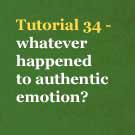The Fundraiser’s Toolbox
You know that fundraising is hard work. To be successful you need to be well equipped to take on all its challenges. At SOFII, we thought you might like some help. So we’ve put together this fundraiser’s toolbox that we’ll be filling with essential examples, formats, articles, case studies, ideas and tips that we think every fundraiser should know about.
Tutorial 29: Slash your letter writing time in half

by Jerry Huntsinger
I’m assuming that you are already familiar with the basic mechanical techniques for creating a fundraising letter. On the other hand, if you don’t know the first thing about writing a fundraising letter, read on anyway. I’ll show you how easy it is and how much fun you can have doing it.
Read moreTutorial 30: How to pass judgment on a fundraising letter

by Jerry Huntsinger
For the attention of those who are responsible for approving fundraising letters: this tutorial is for you.
Read moreTutorial 31: Make me an offer I can’t resist

by Jerry Huntsinger
The problem with nonprofit mail is that often letters ask for a donation, but fail to make an offer.
Read moreTutorial 32: Logic never makes me cry

by Jerry Huntsinger
Jerry argues that without emotion, your letter will fall flat.
Read moreTutorial 33: 20 dangerous ways to get your letter off to a good start

by Jerry Huntsinger
Here Jerry suggests 20 letter openings to help kick-start that creative void, but they come with a warning…
Read moreTutorial 34: Whatever happened to authentic emotion?

by Jerry Huntsinger
In Jerry’s thirty-fourth tutorial he asks, whatever happened to authentic emotion? Inspired by a fundraising letter that arrived through his letterbox recently, Jerry shares with us this example and explains why emotion is the one thing a successful ‘ask’ shouldn’t be without.
Read moreTutorial 35: Mistakes that Brenda doesn’t need to make

by Jerry Huntsinger
When a fresh-faced communications graduate hoping to forge a career in direct mail fundraising asked Jerry Huntsinger (the dean of direct mail) to divulge the mistakes he’d made in his early days so that she could avoid them, he didn’t disappoint.
Read moreTutorial 36: Creative rules not worth breaking

by Jerry Huntsinger
Stop the press. No, really. If you’re about to send out a new direct mail campaign I suggest you have a good read of the latest addition to the Huntsinger tutorials first. This is an absolute essential for anyone in the business of marketing (and that’s really all of us working in charities isn’t it?)
Read moreTutorial 37: creative letter writing for non-creative people.

by Jerry Huntsinger
In this tutorial Jerry explains how discipline will get us into the right frame of mind to create a good letter that will raise lots of money for our causes.
Read moreTutorial 38: how to set up a creative sample file

by Jerry Huntsinger
Find out how you can develop such a file for yourself.
Read moreTutorial 39: writing letters to men, part 1

by Jerry Huntsinger
‘Men are usually more in a rut than women; they have difficulty shifting from one idea to another. They want to see the facts right up front.’ So says Jerry Huntsinger in the first part of his latest tutorial.
Read moreTutorial 40: writing letters to men, part 2

by Jerry Huntsinger
The first part of Jerry Huntsinger’s tutorial on writing for men prompted the comment: ‘What a well put together article. Something I've often thought, but not in such a clear way. It's given me some ideas!’ SOFII is sure you to will find some new ideas in the second part of this interesting tutorial.
Read more






